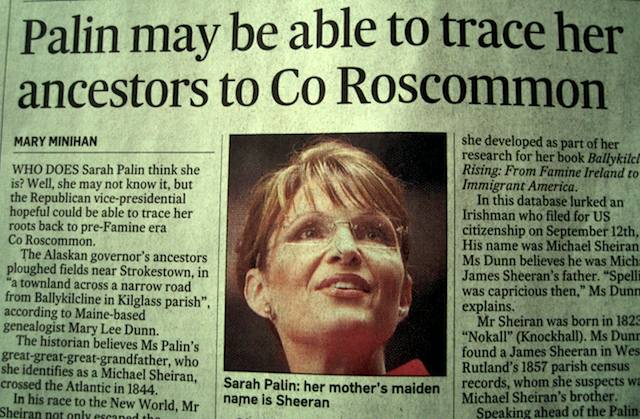Mark Hennessy has an enthralling account of the frantic 24 hours in which the Irish government came up with its dubious wheeze for bailing out the country’s banks.
IRELAND’S top bankers do not usually play a supplicant’s role.
Sitting, however, in Taoiseach Brian Cowen’s oak-lined office shortly before midnight on Monday underneath a portrait of Éamon de Valera there was little doubt about how much trouble they were in.
The bankers uneasily waiting there were Eugene Sheehy and Dermot Gleeson, chief executive and chairman of Allied Irish Bank (AIB) respectively, and their two counterparts from Bank of Ireland, Brian Goggin and Richard Burrows.
Four hours earlier, following a disastrous pounding for Irish bank shares on the stock markets, the four had hurriedly sought a meeting with Cowen and Minister for Finance Brian Lenihan.
Having arrived at Government Buildings at 9.30pm, they were taken to the Sycamore Room, once so beloved of Charles J. Haughey, and left to wait, and wait. Nearby, Cowen was chairing another meeting, involving Central Bank governor John Hurley and the chief executive of the Financial Regulator, Pat Neary.
Two hours elapsed before the bankers, who had been left on their own, were called in before Cowen and Lenihan, who asked some questions, but mostly listened. The bankers’ message was not that Anglo Irish Bank was about to collapse; or that Irish Nationwide was on the brink, though both had cash shortages to face on Tuesday and Wednesday. Instead, it was that they themselves were facing crisis…
Hennessy claims that the option eventually chosen – to guarantee “the deposits, loans and obligations” of the six Irish banks – had “been circulating within the Department of Finance, the Central Bank and Government Buildings for over two weeks”.
So the government knew what was likely to happen.
There’s a good deal of Yes, Minister comedy in the story. For example, it was decided that the decision would be made via a virtual Cabinet meeting conducted by telephone. Apparently this is known in Irish constitutional parlance as an “incorporeal” meeting.
While a number of senior Ministers had already been put on notice, the Cabinet secretariat contacted the remainder, telling them to be ready for the “incorporeal” meeting between 1am and 2am. Even then, most Ministers were not told exactly of the decision’s scope. Willie O’Dea was woken shortly after 1am by his ringing mobile, but it had gone to voicemail by the time he got to it. The landline by his bed rang seconds later.
Green Party leader John Gormley had more knowledge than most of an imminent banking crisis but, up until then, the secretariat had failed to make contact with him because his mobile had run out of power. In the end, Irishtown Garda station was called, and they sent a garda to his Ringsend home to wake him and ask him to ring the Taoiseach’s office.
It’s gets better. The banks left out of the deal were furious.
The statement entered the public arena at 6.45am, causing consternation among the banks not immediately included along with the six Irish institutions. And the consternation made itself heard very, very quickly – and directly to the man next in line for the throne of England.
Furious at the news, Sir Fred “The Shred” Godwin, chief executive of Ulster Bank’s parent, Royal Bank of Scotland, called Prince Charles, as well as the British prime minister Gordon Brown, sources say.
Brown’s chancellor of the exchequer, Alastair Darling, quickly called Lenihan. “He was very unhappy, let’s put it that way,” said one closely involved in the night’s events. Demanding a reversal of the decision, Darling warned that money would flood out of British banks. Lenihan listened, but gave no succour and said he had to protect Ireland’s interests. Later, he called again.
Brown rang Cowen later. Though he expressed concern, he did not ask for the guarantee to be stopped, but he did urge Cowen to do something for UK bank subsidiaries operating here. Replying, Cowen, no doubt conscious of the lack of warning by London when it nationalised Northern Rock 12 months ago, said Ireland had to look after its own banks.
Hennessy also says that
“One senior banker turned up at the Department of Finance offices in Merrion Street without an appointment, demanding to see Lenihan. Sources say he declared: “You’re trying to screw us.”
Well, it made a nice change. The banks have been screwing the Irish consumer for decades.
UPDATE: European Union Competition Commissioner Neelie Kroes said today that the Irish Government’s plan to provide unlimited guarantees on deposits in Irish banks contravenes EU law.
Ms Kroes said there was a discriminatory element to unlimited guarantees on bank deposits and that she expected Ireland to modify its guarantee plans.
She also said she had received assurances from her contacts in Dublin that the Government intended to modify the proposal before presenting it to Cabinet early this week.
MEANWHILE… Frank McNally has been enthralled by the Second October Revolution. In the first one, you will recall, the workers took ownership of the means of production. In October 2008, Irish citizens took ownership of the means of losing money. “Certainly”, he writes,
“I find myself caught up in the new revolutionary fervour. As a taxpayer – and to use Bertie’s terminology – I now ‘have it in my mind’ that I own the AIB and Bank of Ireland. I don’t feel the need to buy a large public building with ATMs and cashiers and toxic loans on its books and all that, because I can go down the road 10 minutes, and there’s one I bought already.
Of course, unlike the Bots [Dublinese for the Botanical Gardens, which Bertin Ahearn famously said he felt, as a taxpayer, that he ‘owned’], the banks are not open on Sunday afternoon. And I don’t want to visit them on Sundays, necessarily. But now that I own them, I’d like the management to work all weekend anyway, just for the hell of it. All this power is intoxicating.”


